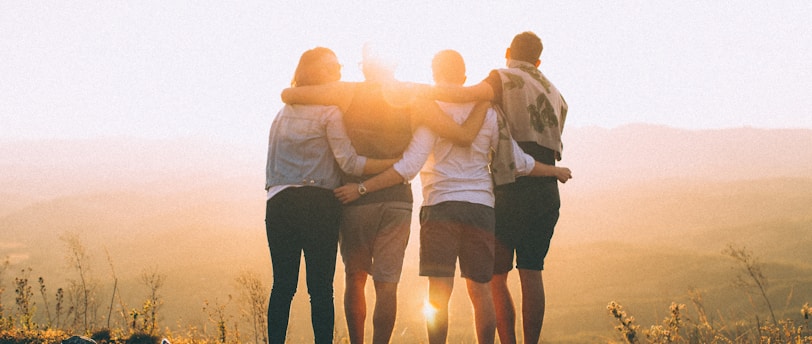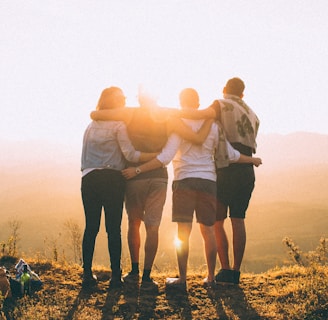The Role of Community in Survival
PSYCHOLOGICAL & SOCIAL SURVIVAL


Why Humans Survive Better Together
From the earliest days of humanity, survival has been tied to cooperation. People who worked together in groups could hunt larger animals, protect one another from threats, and share resources. This truth has not changed. In modern survival situations, whether in a wilderness setting or during a societal collapse, being part of a community greatly improves the odds of making it through.
Strength in Numbers
A single person can only stay alert for so long. In a group, tasks can be divided. While one person keeps watch, others can sleep, gather food, or work on shelter. Having multiple sets of hands means challenges are met more quickly and with less exhaustion. Numbers also create a visible deterrent to outsiders who might want to take advantage of the weak. Simply put, more people often equals more safety.
Sharing Skills and Knowledge
No one has every skill needed to survive. One person may know how to treat injuries, another may be skilled at building, and someone else may have knowledge of edible plants. When these abilities are shared, the community benefits. Teaching each other builds resilience, since the group does not rely on just one person to provide a critical skill. Knowledge pooling makes the community stronger than the sum of its parts.
Emotional Support and Mental Health
Survival is not only physical. Loneliness and despair can break a person’s will faster than hunger. In a community, people can talk, laugh, and share their fears. Even simple companionship reduces stress and creates hope. Knowing that others depend on you also provides a powerful reason to keep going. Emotional bonds transform survival from an isolated struggle into a shared mission.
Division of Labor
Community allows for specialization. Instead of everyone doing a little of everything, tasks can be assigned according to strength and skill. The fastest gatherer focuses on food, the most skilled builder works on shelter, and the best communicator organizes group plans. This division of labor increases efficiency and prevents burnout. Survival becomes more organized and less chaotic when responsibilities are clear.
Resolving Conflict Within Groups
While community has many advantages, it also brings challenges. People do not always agree, and conflicts can arise. Disagreements over food, leadership, or risk-taking can create tension. A successful community must have ways to resolve disputes fairly. Respect, clear rules, and compromise help prevent small issues from tearing the group apart. Strong communities accept that conflict will happen but also have systems to handle it.
The Value of Shared Resources
Pooling resources reduces waste and increases survival chances. Instead of each person keeping their own hidden stash, communities can store food, tools, and supplies together. This ensures that resources are used efficiently and that no one is left behind. Shared resources also build trust, reinforcing the idea that the group is stronger together than apart.
Leadership and Collective Decision-Making
Communities work best when leadership is balanced with participation. Strong leaders provide direction, but decisions should involve input from the group when possible. This shared responsibility prevents resentment and keeps everyone invested in the outcome. People are more likely to follow rules and contribute when they feel their voices matter. Leadership combined with collective decision-making creates unity.
Defense and Security
In dangerous environments, safety in numbers is vital. A group can set watch rotations, build defenses, and respond quickly to threats. One person alone is vulnerable, but a community can coordinate and prepare. Defense is not just physical, it is also psychological. Knowing others are watching your back allows you to rest and focus on other tasks without constant fear.
The Role of Traditions and Rituals
Communities that survive long-term often develop simple traditions. Shared meals, regular meetings, or even songs can become morale boosters. These rituals give structure and identity to the group. They remind people that they are part of something bigger than themselves. Small traditions build pride and help members stay motivated in difficult times.
Adapting as a Group
Flexibility is crucial in survival. Communities that adapt to new conditions stand a better chance of thriving. This might mean moving to a safer location, changing food strategies, or reorganizing roles when someone becomes sick or injured. A group that works together to adapt can face challenges that would overwhelm an individual. Collective problem-solving gives the community strength to endure.
Unity as a Survival Tool
The survival of a community is about more than food, water, or shelter. It is about people choosing to work together rather than against one another. Communities multiply strength, knowledge, and hope. In times of crisis, belonging to a community may be the most powerful survival tool of all.